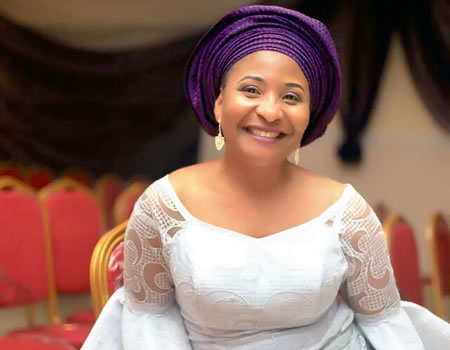What motivated you to become a social worker?
It is a combination of so many things. I was brought up by parents who believed in helping people and making them feel comfortable and respected. I happened to be the last child and as I grew up, I imbibed this culture. It became a lifestyle and passion for me. I found out that anytime I helped people, it gives me so much pleasure. I studied Communication and Language Arts as my first and second degree, got married, worked as a journalist and banker but I still continued to help people especially, children and women. At a point, I turned my passion into a career by running an NGO so, I went back to the University of Ibadan to get a professional degree in Social Works and that was how I started Help Initiative. Our core value is meeting the need of vulnerable women and children. We categorised what we do into three stages, child development, capacity building and women empowerment. The first one has to do with grooming the child either in terms of training, rehabilitation, mentoring or support. We also try to educate women who have more children than they can cater for on the need for them to do family planning and also empower them so that they can be financially independent.
ALSO READ: Keke driver foiled abduction of two siblings in Anambra School
When did you start Tabitha Homes?
Tabitha Homes came in when we realised that children in orphanage homes can live without stigma. I believe that word orphanage is derogatory, it is a stigma and it is discriminatory. When a child goes to school and he is asked where he lives and he says he lives in an orphanage, it registers in the mind of people who put a tag on that child. Even the teachers unconsciously create a disparity between children from orphanage homes and the other children. I worked as a volunteer in many homes before I started Tabitha and realised that many of these children don’t like the tag. There is an African proverb that says that it takes a woman to give birth to child but it takes the entire village to raise the child. So, when you and I are available, why should a child be an orphan? So that is how the idea of Tabitha Homes came about. I feel children can live in a home where they can have male and female care givers who will represent their parents. Care givers who will love and care for them. Here, we befriend them; we teach them to be courteous and to respect elders. We also teach them that we are ready to defend them and to bring out the best out of them. Capacity building for me is very important and that is why inclusive education and social status are important for children in formal homes. The fact that they are in formal homes is not their fault so; they should not suffer for it. They should be brought up in such a way that they will be well integrated into the society. And I always tell them that when they grow up, they should replicate the kindness they are getting here in the society. We want everybody to replicate good behaviour and habit.
Children in Nigeria today are becoming endangered species. As a social worker, what do you think is responsible for this and what is the way out?
A lot of factors are responsible for it. The first factor which is the most important one is from the family; when I say family, I don’t mean father and mother alone, I mean the aunties, uncles, and so on. We don’t have enough time for our children; they are left alone for too long to discover many things on their own. When you don’t teach a child what he should know at the right time, he is very inquisitive so he will try to find out things on his own. These children know a lot. People say children forget, they don’t. Some of these children remember the details of everything that has ever happened to them especially the bad ones. Many of us parents leave the important for the unimportant. We are so busy running around for money to take care of them that we allow them to get exposed to things that they are not supposed to get exposed to. Also, children imitate their parents so the best education for a child is for parents to set good examples for them. The media too is responsible for what is happening in the society. What children are exposed to in the media is not helping matters so we need to let them know what they can and cannot watch even when their parents are not around. Parents, the media, teachers and the government all have roles to play in instilling sound morals and values in children. Things are getting too much out of shape to the extent that when you hear some things that young people are doing, you will be shocked. Parents need to get their priorities right. Capacity building among adult role model s is one of the ways we can control indiscipline and moral decadence in young people. Adult should stand as perfect role moles.
How have you been funding your NGO and Tabitha Homes?
Initially I was using my salary to do it but when it became too much for me, I started involving my family members; my husband, siblings and cousins. At a time I realised that it was getting too much for them so I started involving friends and later some organisations too have been supporting us with their products and food stuff. It has always been a communal support. Government too has been giving us trainings.
What are the challenges of running a home in Nigeria?
The first one is the belief system; people believe some children are dangerous so they don’t want to take them in when they lose their parents. Some were kicked out because they are suffering from certain ailments. Another major challenge is that people look at home operators as fraudsters who used the money they collect to run homes to do something else but the truth is that like in every other profession, there are some bad eggs among us just like there are professionals who are running a structured organisations that are tailored to meet the needs and to support orphans and vulnerable children .A formal home should not be a dumping ground for children in need of basic care only. Children need more than food, clothing and shelter to survive and function effectively. They also need medical care, education and access to skill acquisition and empowerment so that when they grow up, it will be easier for them to be independent, self reliant and to be fully integrated into the community. For us at Tabitha Homes, our greatest challenge is that people look at us as being comfortable because we are professionals who believe in doing things right. We believe in taking good care of the children so that we can erase the stigma and discrimination against orphans. However, because we have been able to create a conducive environment for our children, many people think that we don’t need help. Meanwhile, some times, we struggle to pay rent and salary. We pay school fees, clothe the children and maintain the home and other logistics. When people come here and see this place looking neat and tidy, they believe we are getting grants from abroad. So, anytime we raise the alarm that we need financial support, they don’t always believe us. People come here and say they doubt if we can get help people because the Home is well organised and well kept. Do they expect us to raise the children in shabby environments? It is very upsetting,
How have you been able to combine your career as a social worker with the home front?
I juggle work, career and the home front by balancing all in such a way that none suffers. This I do through proper planning by documenting; that is I draw a To-do list which I follow strictly. Then I delegate duties. It is important to plan, delegate and reproduce ourselves. I have been able to replicate myself in such a way that when I am not around things will still run smoothly. I have an excellent team that ensures my absent is not felt.






